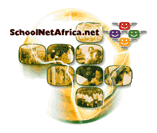An Overview of Donor Agencies with ICT-related Interests
Donor ICT strategies matrix: December 2003
This survey reports on how bilateral and multilateral donors have mainstreamed information and communication technologies (ICT) in their development assistance programmes in order to more effectively and efficiently achieve development goals, particularly the Millennium Development Goals (MDGs). It reports on twenty-three DAC Members and twenty-five multilateral agencies. [1176]
Fullmatrix.pdf
Economic Commission for Africa (ECA)
ECA is the regional arm of the United Nations, mandated to support the economic and social development of its 53 member States, foster regional integration, and promote international co-operation for Africa’s development. Established in 1958 and based in Addis Ababa, Ethiopia, ECA is one of five regional economic commissions under the administrative direction of the UN Headquarters. It reports directly to the UN Economic and Social Council (ECOSOC) through the Conference of African Ministers Responsible for Economic and Social Development and Planning, and convenes a number of intergovernmental organs and committees.The ECA is also responsible for driving the African Information Society Initiative. [803]
http://www.uneca.org/
The Global Knowledge Partnership (GKN)
The Global Knowledge Partnership (GKP) is an evolving, informal partnership of public, private and not-for-profit organisations. Partner organisations are committed to sharing information, experiences and resources to promote broad access to, and effective use of, knowledge and information as tools of sustainable, equitable development. The GKP emerged from the co-operation of several dozen organisations in sponsoring the Global Knowledge 97 conference, "Knowledge for Development in the Information Age" in Toronto, Canada in June 1997. [802]
http://www.globalknowledge.org/
Rockefeller Foundation
The Rockefeller Foundation is a knowledge-based, global foundation with a commitment to enrich and sustain the lives and livelihoods of poor and excluded people throughout the world. First, the Foundation’s primary focus is on people who are poor and excluded. Second, the Foundation is now a truly global foundation. Third, the Foundation aims to improve people's lives and livelihoods. Fourth, the Foundation’s work relies heavily on knowledge. In essence, the aim is to develop a knowledge-based, global foundation that will be as pioneering in the 21st century as John D. Rockefeller was in establishing the Foundation at the beginning of the 20th century. [801]
http://www.rockfound.org/
United Nations Educational, Scientific and Cultural Organisation (UNESCO)
UNESCO was established in 1945. It currently has 188 Member States. The main objective of UNESCO is to contribute to peace and security in the world by promoting collaboration among nations through education, science, culture and communication in order to further universal respect for justice, for the rule of law and for the human rights and fundamental freedoms which are affirmed for the peoples of the world, without distinction of race, sex, language or religion, by the Charter of the United Nations. [800]
http://www.unesco.org/
Ford Foundation
The Ford Foundation is one source of support for these activities. The Foundation works mainly by making grants or loans that build knowledge and strengthen organisations and networks. Founded in 1936, the Foundation operated as a local philanthropy in the state of Michigan until 1950, when it expanded to become a national and inter-national foundation. Since its inception it has been an independent, non-profit, non-governmental organisation. It has provided slightly more than $10 billion in grants and loans. The Trustees of the Foundation set policy and delegate authority to the president and senior staff for the Foundation's grant making and operations. Programme officers in the United States, Africa, the Middle East, Asia, Latin America and Russia explore opportunities to pursue the Foundation's goals, formulate strategies and recommend proposals for funding. [799]
http://www.fordfound.org/
Devenir Foundation
The Foundation operates in the field of information and communication technologies at two levels. At the international level, it promotes African countries' acquisition of information technologies for local development purposes. In that connection, it contributes to discussion of the challenges of these technologies for strengthening democracy, disseminating sustainable economic and social practices, and bringing about more equitable co-operation among nations. Moreover, it promotes a renewed partnership between Europe and Africa. [798]
http://www.fdd.org/
The Department for International Development (DFID)
The bulk of DFID's assistance is concentrated on the poorest countries in Asia and Sub-Saharan Africa. In addition, DFID contributes to eliminating poverty and supporting sustainable development in middle-income countries, as well as helping countries in Central and Eastern Europe ('transition countries') to try to ensure that the largest number of people benefit from the process of change. Alongside headquarters in London and East Kilbride, DFID has offices in New Delhi, Bangkok, Nairobi, Harare, Pretoria, Dhaka, Suva, Bridgetown and Kathmandu. In other parts of the world, DFID works through staff based in British embassies and high commissions. [797]
http://www.dfid.gov.uk/
The Commonwealth of Learning (COL)
Founded in 1987 by Commonwealth Heads of Government at their meeting in Vancouver, Canada, The Commonwealth of Learning has a mandate to stimulate and foster the development and sharing of open learning/distance education materials, expertise and technologies, and other resources for learners throughout the Commonwealth. Responding to needs expressed by the Commonwealth's 54 member governments, it engages in both in-country and regional project work, as well as fee-for-service consulting for international agencies and national governments. Headquartered in Vancouver, The Commonwealth of Learning (COL) is the world's only intergovernmental organisation solely concerned with the promotion and development of distance education and open learning. COL is helping to increase the capacities of developing nations to meet the demands for improved access to quality education and training. [796]
http://www.col.org/
Carnegie Corporation
The Carnegie Corporation's assistance to the African continent began in 1926, aimed at building African university systems and libraries in Commonwealth countries through the 1960s. In the 1970s it promoted the practice of public interest law in South Africa and, in the 1980s and 1990s, fostered science and technology policy development, research on women's health, education, and legal status, and the use of electronic information systems in key scientific and academic institutions. [795]
http://www.carnegie.org/
Canadian International Development Agency (CIDA)
(CIDA) is the federal agency responsible for administering most of Canada's official development assistance programme. CIDA has six programming priorities: Basic Human Needs; Women in Development and Gender Equity; Infrastructure Services; Human Rights, Democracy, Good Governance; Private Sector Development; and Environment. Although CIDA does not have a programme focused at ICTs, the use of ICTs and their role in development are pursued across its programmes and projects. The bulk of CIDA's ICT investments occur in this way. Most of the interventions consist of providing assistance to developing countries in helping them create an enabling environment that will optimise the proper functioning of the ICT Sector in their countries. This is usually comprised of a long term programme of institutional strengthening focused on policy and regulatory matters, participation of the private sector etc. [794]
http://www.acdi-cida.gc.ca/
British Council
The aim of the British Council is to create enduring partnerships between British and other cultures and we do this by creating opportunities to connect with the latest skills, ideas and experience from the UK. The Information Exchange and Knowledge Management programme of the British Council is committed to the development of open and thriving information societies world-wide. The Council works in partnership with organisations in the UK and around the world to ensure that the UK plays an international role in this field. [793]
http://www.britcoun.org/
Benton Foundation
Since 1981, the Benton Foundation has worked to realise the social benefits made possible by the public interest use of communications. Through its projects, the foundation seeks to shape the emerging communications environment in the public interest. Bridging the worlds of philanthropy, public policy and community action, Benton demonstrates and promotes the use of digital media to engage, equip and connect people to solve social problems. [792]
http://www.benton.org/


